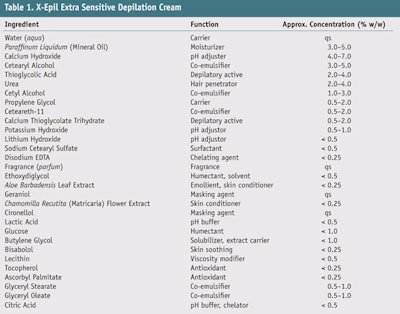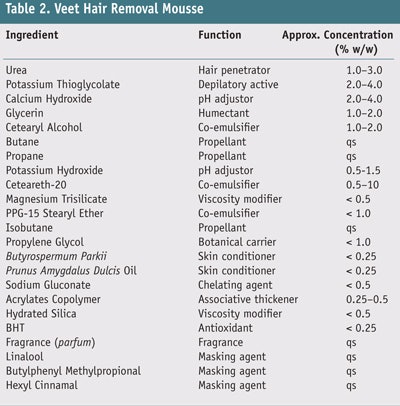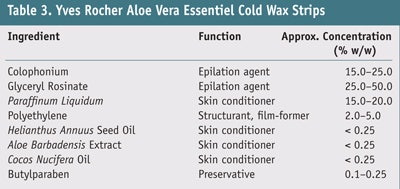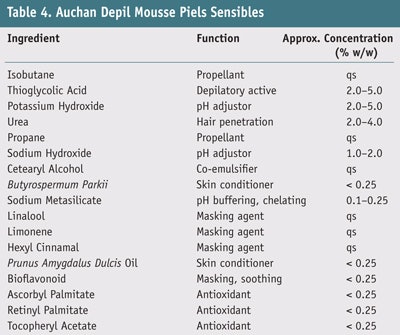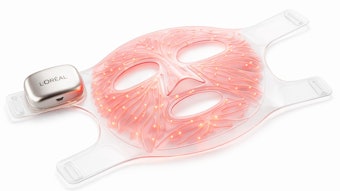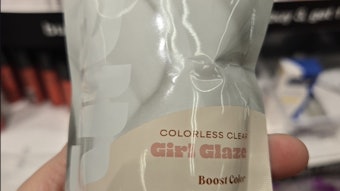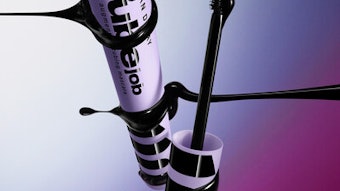There are many approaches to temporary body hair removal including shaving, epilation/electrolysis, depilation, waxing, plucking and other therapeutic anti-androgen/enzymatic treatments. They all have general advantages and drawbacks. For instance, shaving requires continuous hair removal and can lead to skin irritation from abrasion. Epilation removes the entire hair shaft from the root for long-term hair removal but can be painful and can even cause scarring if not properly performed. Depilation is effective and provides extended hair reduction but due to its high pH, is potentially irritating. Waxing and plucking do not effectively or completely remove hair and can be painful. Finally, anti-androgen and enzymatic treatments require proper timing, i.e. within the hair cycle stage, to provide long-lasting hair removal.
There are also permanent approaches to hair removal that target and destroy the mechanisms regulating hair growth, including electro-epilation, photo-epilation and ultrasound-epilation. In addition, the thermo-laser approach heats hair follicles pretreated with a specific black-colored solution that, once heated, destroys the hair, resulting in the long-term retardation of hair growth. Although some permanent approaches to hair depilation can be effective, this column will focus on creating personal care formulations for the temporary depilation of hair.
Key Components of Hair Depilation
The key chemical necessary for hair depilation is based on an alkaline reducing agent that disintegrates the disulfide bonds (S-S) formed between cysteine units of keratin molecules in hair; this allows for the easy removal of hair by washing the skin surface. This depilatory action allows for the formation of new disulfide bonds (e.g., thioglycolic acid). This reaction is shown in Figure 1 on Page 24.
There are a limited number of cosmetically acceptable, strong alkaline bases available because the pH must be > 11 and they must be stable in the formulation and safe for use. The most widely used category of alkaline bases are mercaptans, known as thioglycolic acid (and salts). They are typically used in a formula around 4–6% and include a strong alkaline salt such as sodium hydroxide, lithium hydroxide or calcium hydroxide to buffer the pH to greater than 11. A key limitation of thioglycolic acid and its derivatives is susceptibility to oxidation by mechanisms such as air, high temperatures and trace metal-ions. Of these three mechanisms, trace metal-ion catalysis is the most detrimental to hair depilatory formulations. In general, calcium and lithium salts are considered the least irritating salt forms.
Depilatory actives can be ionized or nonionized as well as water-soluble or water-dispersible. Some examples of depilatory actives include: potassium or calcium thioglycolate, thioglycerol, 2-mercaptopropionic acid, monoethanolamine thioglycolic acid, homocysteine, cysteine and glutathione, etc. (see Depilatory Actives). The other components of a depilatory formula are chosen based on their compatibility with a high alkaline pH as well as skin-conditioning properties. If the formula is an emulsion, emulsifiers must meet the above conditions and fatty alcohols, alkaline-associative thickeners such as carbomer, hydroxyethyl cellulose and nonionic co-emulsifiers are considered acceptable. Formulators creating a hair depilation product typically are cautioned not to use fatty acid esters due to their instability at high pH levels. Hair shaft-penetrating swelling agents such as urea, thiourea and guanidine carbonate are also incorporated to assist in accelerating the penetration of depilatory actives.
Recent Hair Depilation Patents
Although depilatory hair removal has remained relatively constant for the past few years, current trends are to develop more naturally based depilatory agents, less irritating formulas, or to affect the hair growth cycle. Following are a few of the more recent patents issued in the depilatory category. Structured depilatory compositions: The applicants of this patent sought to combine favorable rheology and the aesthetics of a structured system with a depilatory active, resulting in a depilatory composition that is aesthetically pleasing, is phase-stable, and that exhibits one or more additional properties such as easy wash-off and/or mildness.1 Specifically, the patent inventors have addressed the belief that aggressive depilatory actives combined with high levels of electrolyte, which are required to augment the efficacy of the depilatory, make it difficult to form a stable structured depilatory composition. By combining at least one depilatory active with at least one surfactant, the new composition yields a desirable attribute known as heaping, i.e. the ability to recover shape rapidly and form peaks when subjected to shearing. Any variety of suitable surfactants including anionic surfactants may be used in the compositions of the present invention, preferably such that the final composition has either a yield stress from approximately 1—1500 Pa and/or and Hauesorff-Besicovitch dimension of less than approximately 1.7.
Endothelin active for depilation: This invention relates to depilatories and external preparations containing endothelin or its agonist, and also to a depilating method characterized by administering endothelin or its agonist.2 Endothelin is a peptide composed of 21 amino acid residues that, to date, is known to include three iso-forms: endothelin-1, endothelin-2 and endothelin-3. Endothelin is a physiologically active substance that directly or indirectly causes persistent contraction of vascular and non-vascular smooth muscles. In recent years, the role of endothelin in ontogenesis has been tied to various cells such as gliacytes, renal mesangial cells and melanocytes. The depilatory effects of endothelin in the present invention are based on inhibiting hair growth by transitioning hair follicles from the growth phase (anagen) to the regression phase (catagen).
In addition to endothelin, one or more ingredients having hair growth inhibitory and/or depilatory effects, such as keratolytic agents and thioglycolic acid and salts thereof, may be added to the depilatory and external preparation. Examples of the keratolytic agents can include lactic acid, salicylic acid, glycolic acid, citric acid and malic acid.
Non-irritant, rapid-action depilatory composition: This patent discloses a rapid-acting, non-irritating depilatory that reduces exposure time by utilizing a high pH composition. The composition consists of at least one bisulphite and/or sulphite compound of an aldehyde or ketone such as: acetaldehyde, propionaldehyde, butyraldehyde, benzaldehyde, glyoxal or glyoxylic acid, and an organic reducing agent in a cosmetically acceptable medium. It has been found that the reducing action of the bisulphite and/or sulphite compound responds to the organic reducing agent, encouraging the reaction of free sulfur-hydrogen groups in hair’s cysteine units and thus making rapid solubilization of keratin and faster hair removal possible. In addition, improved depilatory activity was observed when the acid components of the composition were in a salt form such as sodium, potassium, strontium, calcium, magnesium and arginine, with a strong organic base such as guanidine, hydrazine or hydroxylamine to increase the denaturing power—requiring an approximate 6–13.5 pKa.3
Enzyme inhibition for reduced hair growth: According to this patent, the rate and character of hair growth can be altered by applying inhibitors of certain enzymes such as 5-alpha reductase, ornithine decarboxylase, S-adenosylmethionine decarboxylase, gamma-glutamyl transpeptidase and transglutaminase to skin. Specifically, a method is disclosed for reducing unwanted hair growth by applying to the skin an agonist of farnesoid X receptor in an effective amount. Farnesoid X receptor, also referred to as FXR, RIP14, bile acid receptor, BAR, HRR1 or NR1H4, is a member of the family of ligand-activated transcription factors that binds to specific cis-acting regulatory elements and modulates gene expression. These receptors bind as dimers of either two molecules of the same receptor (homodimers) or one molecule each of two different receptors (heterodimers).
Farnesoid X receptor forms a heterodimer with the retinoid X receptor (RXR) and binds to an inverted hexa- nucleotide repeat spaced by one nucleotide to promote its target gene. It is activated through interaction with ligands such as farnesoids and bile acids. Co-activators such as DRIP205/TRAP220, SRC-1 and PGC-1 alpha can also enhance the transcriptional activity of farnesoid X receptor by bridging between the ligand-activated farnesoid X receptors and basal transcription machinery, and/or influencing the chromatin structure.
In the disclosed patent, the farnesoid X agonist is preferably a compound from the group of bile acids and/or their analogs or derivatives, and a compound from the group of farnesoids and/or their analogs or derivatives that interact strongly with farnesoid X receptor upon application to skin.4
Featured Ingredient: Thioglycolic Acid
Thioglycolic acid and its alkaline salts have been used as depilatory agents for years in the personal care industry. They are classified as thiols, i.e., compounds that contain a sulfur-hydrogen functional bond, and are considered stronger acids. Thiolate-conjugated bases are easily formed and are effective nucleophiles in the bimolecular nucleophilic substitution (SN2 reactions) of alkyl halides and tosylates. Thioglycolic acid is a simple sulfur, group-chained, carboxylic acid, as shown in Figure 2.
A clear, water-soluble liquid, thioglycolic acid melts at -16°C and boils at 96°C. Its sulfur group is reactive with bases, acids, ketones and organic halogen compounds while its carboxylic acid group is preferentially reactive in the presence of alcohols or amines. The material has been applied in both body hair removal and in hair resetting, e.g. hair straightening and waving. Additionally, thioglycolic acid and its derivatives are also used: to inhibit corrosion in the oil field industry; in the shrink-resistant treatment of wool; in fabric dyeing; in leather processing; and as the starting material for the synthesis of PVC stabilizers.
Finished Depilatory Products
The following formulations provide a cross-sectional sampling of depilatories currently available on the market in various product forms—i.e., cream, spray and mousse. The information presented is taken from publicly available sources and is included for illustrative purposes only. The estimated ingredient ranges are provided as a starting point from which formulators can build their own unique formulas.
X-Epil Extra Sensitive Depilation Cream: This cream, shown in Figure 3, is formulated with aloe vera to moisturize sensitive skin. The dermatological-tested product claims to gently yet thoroughly remove unwanted hair from the face, legs, underarms and bikini zone. This is an emulsion utilizing cetearyl alcohol, cetyl alcohol, ceteareth-11, glyceryl stearate and glyceryl oleate as the emulsifier package. Key actives include the hydroxide bases and thioglycolic acid/salts for cleavage of the disulfide bond, as well as urea to help facilitate rapid penetration into the hair. Approximate ingredient concentrations for the formula are shown in Table 1 on Page 24.
Veet Hair Removal Mousse: This mousse, pictured in Figure 4, is formulated with a moisturizing complex of shea butter and lily. The product is said to make depilation easier and remove hair in three minutes without shaving. The mousse is produced with a butane propane propellant along with acrylates copolymer, ceteareth-20 and PPG-15 stearyl ether as suspending agents. Approximate amounts of each ingredient are given in Table 2. Key active ingredients are the hydroxide bases and the thioglycolic acid/salts for cleavage of the disulfide bond and, again, urea to help facilitate rapid penetration into the hair.
Yves Rocher Aloe Vera Essentiel Cold Wax Strips: These strips, shown in Figure 5, offer gentle depilation with soothing and softening aloe vera. The wax strips remove hair with a long-lasting result that reportedly lasts up to four weeks. The formula ingredients as well as their function and approximate concentration are listed in Table 3. The key ingredients in the strips are glyceryl rosinate and polyethylene, to develop the wax structure, and Paraffinum liquidum to soften the wax system.
Auchan Depil Mousse Piels Sensibles (Hair Removing Mousse for Sensitive Skin): The depilatory mousse shown in Figure 6 contains almond oil, shea butter and vitamins A, C, and E to reportedly leave skin soft, smooth and moisturized. Table 4 lists the ingredients in the product, along with their function and approximate concentrations. Key actives are thioglycolic acid, neutralized with potassium/sodium hydroxide, along with an isobutene/propane propellant system and carbomer/ceteareth-20 emulsifier system Formulator Beware Prior to the evolution of thioglycolate actives for chemical depilation, other actives were used with varying success. Sulfides, particularly barium polysulfide, have been around for more than 100 years. While these materials are capable of rapid depilation, they also can produce drastic depilation due to the high levels of irritation and erythema they cause. An alternative to barium polysulfide is strontium sulfide, which is milder but requires higher concentrations and produces a less desirable hydrogen sulfide odor. Due to the disadvantages of sulfides, the majority of depilatory agents today are based on substituted mercaptans (thioglycolates).
Genetic replication and genomics may soon enable other products to be launched that minimize hair growth or improve hair removal in a more natural manner.
As noted, although depilatory hair removal has stayed relatively consistent, the current trends are to develop more naturally based depilatories or those that remove hair as well as affect the hair growth cycle. The challenge of developing natural depilatories is that hair removal by chemical action requires high-pH ingredients and these are not easily found in nature, or they often do not have comprehensive safety substantiation. For the most part, natural claims are associated with the use of botanical ingredients or those not directly associated with depilation action. A good example is Zingiber officinale (ginger) root extract, which can minimize hair growth and thus reduce the frequency of shaving required.
References
Send e-mail to [email protected].
1. US Patent Application 20,090,005,462, Structured depilatory compositions, ET Gunn and MR Tyerech (Jan 1, 2009)
2. US Patent 7,468,421, Depilatories and agents for external use, A Ohuchi, A Kobayashi and A Hachiya, assigned to Kao Corp. (Dec 23, 2008)
3. US Patent Application 20,090,004,128, Non-irritant rapid-action depilatory composition, M Flork (Jan 1, 2009)
4. US Patent Application 20,100,021,412, Reduction of hair growth, CS Hwang (Jan 28, 2010)
